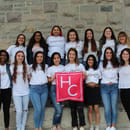***Trigger warning: the following content may be sensitive to the AAPI community and/or victims of sexual violence***
“Dead women is just a thing that we have all just accepted as part of our daily lives.” Jess Phillips (2021)
March is the beginning of Women’s History Month yet all we’ve seen is blood. On March 13, one year after Breonna Taylor’s unjustifiable death, Sarah Everard was found murdered. Blessing Olusegun died by drowning, but the cops failed to bring justice and considered her death “unexplainable”. On March 16, eight people — six being women of Asian descent — were brutally murdered in what seems to be a racially motivated attack in Atlanta. This perpetual cycle of violence against women needs to be discussed, and it goes beyond telling women to not walk alone. In Everard’s case, she followed every rule that women understand: don’t be out after midnight, stay in well lit areas, share your location with someone you can trust, and yet she still ended up kidnapped and murdered. In the Atlanta case, these women were doing their job, yet they still ended up murdered. How can we stop this cycle, and how can we begin to talk about such a hard subject?
According to the World Health Organization, 35 percent of women across the world experience some form of physical and/or sexual violence from their partner, or sexual violence from a non-partner (WHO, 2013). However, that number could potentially be higher considering that number of women who can’t, or don’t, report the violence taking place. This is a staggering number, but it shouldn’t be surprising — especially to women.
All of our lives, we have been taught that “boys will be boys”, that “girls just mature faster”, that “he’s doing that to get a reaction out of you.” Since the 1990s, educator Jackson Katz has been using feminist ideas for an exercise he uses in class. In 2018, Twitter user Jennifer Wright posted one such exercise that showcases how men and women protect themselves from sexual harassment. While men only had one response, “Nothing. I don’t think about it.”, the list for women was exhaustive. From carrying pepper spray to changing your route home to avoiding wooded areas, the women in his classes knew exactly what they needed to do as a way to survive. These lessons are so ingrained in us that we find ourselves excusing the actions of men, talking about what happened to us in passive voices, as if that will stop these heinous actions from repeating themselves.
The process of wiring our brains to think in those ways starts young, with simple things like “girls don’t play with those” and “what are you, a boy?” We have been mocked for liking feminine things, mocked for liking masculine things, mocked for liking anything, yet also mocked if we are considered basic. Women throughout history have been ridiculed for everything and anything that they may do, while their counterparts are praised for everything. By the time women have reached adulthood, they either reject anything that may even be remotely feminine or they have accepted that they can’t like anything that men deem manly; this dichotomy is toxic and hurts everyone. So, what happens to the women who don’t listen to these norms? They are blasted at all sides with misogyny; men and women telling them they aren’t good enough, that they can’t be women, that they need to pick a side, and how can someone who likes manly and feminine things be a woman?
Just writing about this makes me sick to my stomach because, like every other woman, I have heard these things myself. I’ve been told that I’m a dude for having short hair, that I’m too intimidating so no one will ever date me, that I’m always dressed up for no reason, that I have man hands, that I need to find a boyfriend, and that I’m never going to be enough to be accepted by society. In fact, there are times that I wonder if I’m not good enough because, unlike my friends, I’m not catcalled and I’m never asked to go on a date. I was only “good enough” for that objectification when I was 10 years old and going for a walk with my friend when an older man whistled at my prepubescent body while he was driving down my street. Although that may have been too much personal information, I’m not the only woman who has felt that way before. This culture of needing to have a man’s attention is so normal that women feel they are not enough if they cannot be objectified for the pleasure of a stranger on the sidewalk — even as a child.
Although this article may be hard to swallow, we need to talk about violence and hatred women face every single day and how we can try to stop this cycle.
One of the biggest starting points is to believe women when they say they have been a victim of violence, and when they say they have dealt with gender-based ridicule. Women won’t talk about what they’ve endured when they feel there is an environment of distrust, which is completely normal. The key thing to do is let them know that you believe them, you’re here for them, and what they are feeling is valid. Give them the support and space they need to begin an open discussion.
Another key component is to educate yourself. No one likes having to be the educator, so be proactive in your steps towards understanding violence against women. Organizations such as UN Women and local groups such as Virginia’s VSDV Action Alliance are great places to begin learning about this harsh topic. Women don’t want to feel burdened in educating others on why they should be believed and why it’s hard to feel peace with such violent acts happening, so it’s important that you take the right steps in doing the research yourself.
The third component is the stand up against rape culture. Rape culture is, by definition, “a society or environment whose prevailing social attitudes have the effect of normalizing or trivializing sexual assault and abuse”. In order to stand up against rape culture, you need to evaluate how your own biases affect rape culture: how do you define masculine and feminine, what are some of the beliefs and behaviors you hold, what stereotypes do you have, and how can this affect groups of people? By doing so, you are making changes within yourself that can be reflected in society and the environment around you.
Lastly, you need to hold yourself and others accountable. Educating yourself, standing up for others and believing women are all crucial steps in trying to unlearn this cycle of violence, but without accountability, nothing will change. By pretending you haven’t done anything wrong, you are excusing your own actions and the actions of anyone else. Call out catcalling, call out sexist jokes, call out inappropriate comments and call out this state of violence. Don’t idly sit by as people, or yourself, make these comments that cause more harm than good.
This article is meant to make you feel uncomfortable. I, as the writer, am uncomfortable writing this piece. I shouldn’t have to write about this and neither should anyone else. However, if no one talks about this, there will be no end to the violence.
As unfortunate as it is, there is no longer shock value in the deaths of women, there is no longer shock in the light of violence against women. We have become desensitized by the actions that we’ve allowed to go unpunished that we are no longer saddened by the unnecessary deaths of the beautiful women in our lives. Breonna Taylor, Sarah Everard, Blessing Olusegun, Delania Yaun, Xiaojie Tan and Daoyou Feng. Let us not forget them, or the women that came before.
If you or someone you know is experiencing sexual or domestic violence in the Virginia area, please call the Virginia Sexual and Domestic Violence Alliance Hotline at: 1-800-838-8238, or text with an advocate at 804-793-9999. If it is an emergency, please call 911. You are not in this alone.



